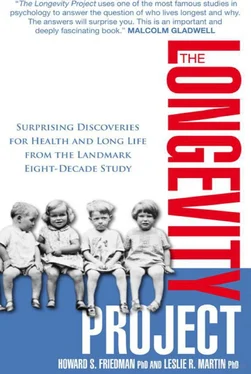The finding was no fluke. The magnitude of the detrimental link between cheerfulness and early death was comparable to other known risk factors for mortality such as high blood pressure and high cholesterol. This surprising discovery—that the serious Emmas of the world outlived the cheery Pauls—launched us toward many years of investigation into the relationship between good humor and health. We found that healthy people are happy but happy people are not necessarily healthy. How could this be?
Terman’s cheerful children were those whose parents and teachers reported them to be optimistic and cheerful: “Extraordinarily cheerful and optimistic. Never sees dark side. Never worries.” Participants were categorized as having a good sense of humor if the grown-ups in their lives judged them, for example, thus: “Witty. Appreciates jokes. Sees the funny side of everything.” Paul, for one, was a fun guy to be around. He laughed often and was rarely ill, only occasionally having a cold. Although he wasn’t especially nervous or fearful, his parents felt he was particularly sensitive to the approval and disapproval of others. His parents reported that he slept soundly, usually eight hours per night. They also described him as energetic and sociable, but as more selfish than average. They noted that he “tends to be a leader.” Paul and many of the other very cheerful Terman children were not strikingly different from their childhood peers, except for their exceptionally optimistic and fun-loving personalities.
Many people would think that these wags and wits should be less prone to disease, but, as we discovered, such a personality also has its downsides. The experience of joy and other positive emotions can inspire us to do wonderful things in life—raise a child, cooperate with one’s team, help someone in need. Good research shows that joyful, engaged individuals are better able to thrive and build positive bonds with others, especially compared to people who are dejected or depressed. But that doesn’t mean that going to lively gatherings or swallowing antidepressants will thereby improve health. The real question is: Which comes first, the vigor or the cheer?
Many people believe happiness leads to health because, observably, the two often appear hand in hand—happiness is often associated with health. The correlation has been confirmed as significant in lots of studies, but it does not mean that the happiness is the direct cause of good health. In fact, we have found that in most cases, it is something else—some other set of characteristics—that makes someone both happier and healthier. This distinction is tremendously important because it affects what you should do to maintain and improve health.
Where does some scientific research go wrong? It is easy enough to measure happiness: just ask people (or their friends) how happy or content they feel. In good studies, this assessment is repeated at several times of the day and week.
But how do we assess health? Few researchers are able to follow individuals—those who are very happy, those who are just average, and those who are very sober—for long periods of time to see how long they live and what serious diseases they develop. Instead, they ask subjects, “How healthy are you?” The catch is that people who say they are really happy also are those who are most likely to say they are healthy, which tells us nothing about whether their physicians have diagnosed, say, a significant narrowing of their coronary arteries.
Now, the dream scenario would be rigorous studies that made ill individuals happier (through happiness interventions like “counting one’s blessings”) and then looked to see if they recovered. For example, some individuals with cancer could be scientifically assigned to receive extra treatment and instruction from experts on happiness while a comparison group would receive only the usual cancer treatment. Framed this way, there is very little solid evidence that happiness or good cheer is the panacea that it is often held out to be. 15 15 For an article on psychotherapy and cancer, see J. C. Coyne, B. D. Thombs, M. Stefanek, S. C. Palmer, “Time to Let Go of the Illusion That Psychotherapy Extends the Survival of Cancer Patients: Reply to Kraemer, Kuchler, and Spiegel,” Psychological Bulletin 135, no. 2 (2009): 179-82.
Merriment and Unhealthy Behavior
Is a merry, joyful disposition the mark of great health? Think of our favorite comedians: often they are jocular jesters because they grew up facing very difficult or oppressive situations; they may use humor and joking around to try to cover up trauma or abuse. The upside is that these people have found a way to help themselves cope with severe challenges. The downside is that they have had to experience such obstacles in the first place. Many comedians are, under the surface, grappling with a difficult past. They also tend not to lead the healthiest of lifestyles. Studies of comedians have found that they do not live longer than the rest of us. J. D. Salinger may have been on to something when he wrote, “I’m a kind of paranoiac in reverse. I suspect people of plotting to make me happy.” 16 16 The J. D. Salinger quote is from Raise High the Roof Beam, Carpenters and Seymour: An Introduction (Boston: Little, Brown, 1959), 88.
As we dug in to see why the serious Emmas of the world outlived the cheery Pauls, we considered a number of possibilities. 17 17 For one of our studies of cheerfulness and longevity, see L. R. Martin, H. S. Friedman, J. S. Tucker, C. Tomlinson-Keasey, M. H. Criqui, and J. E. Schwartz, “A Life Course Perspective on Childhood Cheerfulness and Its Relation to Mortality Risk,” Personality and Social Psychology Bulletin 28 (2002): 1155-65.
First we looked at what they eventually died from—the causes of death on the certificates that we had collected. Not only were the cheerful Terman participants more likely to die young, we found a hint that the cheerful children were relatively less likely than the average person to die from cancer or heart disease and were instead slightly more likely to die from suicide, accident, or homicide. They also grew up to be more carefree, the “sort who never worry over possible misfortunes,” as Dr. Terman put it in 1940. In other words, some of the very cheerful children were either hiding some troubling aspect of their lives or were oblivious to dangers around them. However, we did not find that the cheerful children grew up to be especially poorly adjusted as adults.
We thought that extra health risks might partially be due to something about their daily healthy and unhealthy behaviors. Did the cheerful young children grow up to have poorer habits, perhaps because they were less concerned about things that could go wrong with their bodies? We did find that the Terman children higher on cheerfulness grew up to drink more alcohol and smoke more cigarettes, and vice versa. Emma fit this pattern, as one of the more sober Terman participants who never smoked and reported seldom drinking alcohol. (Maybe it’s no coincidence that the word cheers is a common toast when clinking alcohol-filled glasses—for individuals on the way to being full of good spirits.)
Did the happy souls actually live life on the edge, seeking out dangerous situations? To find out, we coded their hobbies according to how risky they were. Some participants loved thrilling activities such as aviation and hunting while others preferred safe pastimes such as reading or listening to music. The cheerful children were the ones who grew up to engage in riskier hobbies. Overall, many had a happy-go-lucky disregard for their health. “Put a smile on your face, and lighten up”—cheer up and live long—is another dead-end health myth.
Читать дальше











